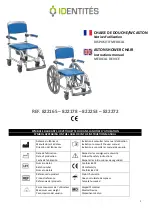
SECTION 5—ARMS
Part No 1134872
31
Crossfire
™
Series Wheelchairs
Adjusting Swingaway Padded Armrest Height
NOTE: For this procedure, refer to FIGURE 5.2.
1. Remove the half arm from the arm socket.
2. Remove the mounting bolt, two washers and locknut mounted in the arm socket that
determine the swingaway padded armrest height.
3. Reposition mounting bolt and one washer to one of three positions in the arm socket
depending on the desired height.
4. Retighten the mounting bolt and washer to the arm socket with the remaining washer
and locknut.
5. Reinstall the half arm into the arm socket.
6. Repeat STEPS 1-5 for the opposite side, if necessary.
FIGURE 5.2
Adjusting Swingaway Padded Armrest Height
Swingaway Padded Armrest
Arm Socket
Mounting Bolt
Locknut
Washer
Three Mounting Positions
Washer
















































